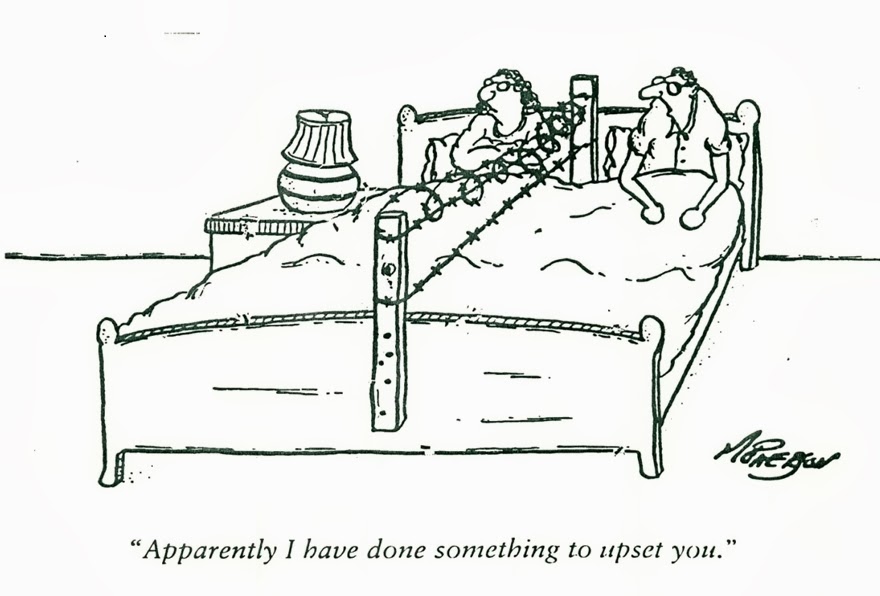A friend and frequent reader of my blog just pointed out to me that I’m writing a lot of posts on arguing and conflict.
“I don’t know why,” I replied. “I think it just puts me in the Christmasy mood. Nothing says ‘Happy Holidays’ like cold-cocking someone in the nose.”
“You’re exaggerating,” she responded.
“Fine. How about this.” I make a motion with my hands like I’m outlining a marquee. “Fights, Drunkenness, and Other Heart-warming Christmas traditions?”
She sighed. “You’re the Grinch and Freud all wrapped up in one.”
What I love about conducting research studies on human behavior is that there are so many ways you can look at the data you collect, and so many statistical nooks and crannies to explore. For example, when I was looking at the data we collected from our Arguing Style Test, I decided to focus my attention on a unique group: People whose tendency to fight has lead to at least one break-up of a romantic relationship. What is it about their approach to arguing that results in such a dramatic ending? Do they fight dirty? Here’s what I uncovered:
- 60% of my poor fighters raise their voice when they get upset (compared to 50% for people who have never had a relationship-ending fight).
- 32% refuse to be the first one to apologize (compared to 24%).
- 44% allow old grudges to resurface during arguments (compared to 33%).
- 40% swear at their partner when they’re upset (compared to 27%).
- 65% agree with partner when he/she makes a valid point in an argument (compared to 75%).
- 52% feel the need to win the fight (compared to 44%).
- 38% get defensive when they’re partner tells his/her side of a story or puts forth his/her argument (compared to 28%).
- During a fight, 58% will bring up all the issues that are bothering them (compared to 47%).
- 55% tell their partner what he/she needs to do to “fix his/her problems” (compared to 49%).
- When hurt, 49% will focus their attack on something their partner really cares about (compared to 28%).
- 32% point out their partner’s character flaws (compared to 20%).
- 46% make up right away after fighting (compared to 57%).
- 47% will validate their partner’s feelings even if they don’t agree with his/her arguments (compared to 56%).
- 34% believe that they and their partner come out as better people after a fight (compared to 46%).
I think we can safely say that it’s a combination of issues that results in a relationship-ending fight rather than one nagging problem. It could also be that couples are more likely to call it quits after years of chronic and unhealthy fighting tactics. In my case, for example, I was more likely to let issues slide rather than risk an all-out fight. As you can imagine, it didn’t make things better, and resulted in a build-up of frustration. I was a ticking time-bomb, and when I finally did vent my anger, it wasn’t pretty (I can give some rather tough verbal punches).
So how about we lay some ground rules for fighting fair on the holidays? Here goes:
- Put that turkey drumstick down before engaging in a fight. It’s such a pity to waste good food.
- Sparkly garland is very versatile. It can be used for decoration and for restraining someone when they’re being unreasonable.
- Don’t use Christmas as an opportunity to tell people they’ve gained weight. Just don’t go there. After stuffing yourself at dinner with 5 courses of food and 7 desserts, you’ll probably be looking a little jolly yourself. Those who live to eat gingerbread houses should not throw stones.
- You’re right – fruitcake, a tie, socks, or an ironing board are not good presents. We all agree. Just take a deep breath and return the gift tomorrow.
- Someone at some point during the night is going to make fun of/criticize your cooking, sweater, or decorations. Accept it. Accept it by drinking more eggnog.
- Remember, it’s called “mistletoe” not “missile toe.”
- It’s “naughty list” not “revenge list.”
Happy Holidays!
Queen D


